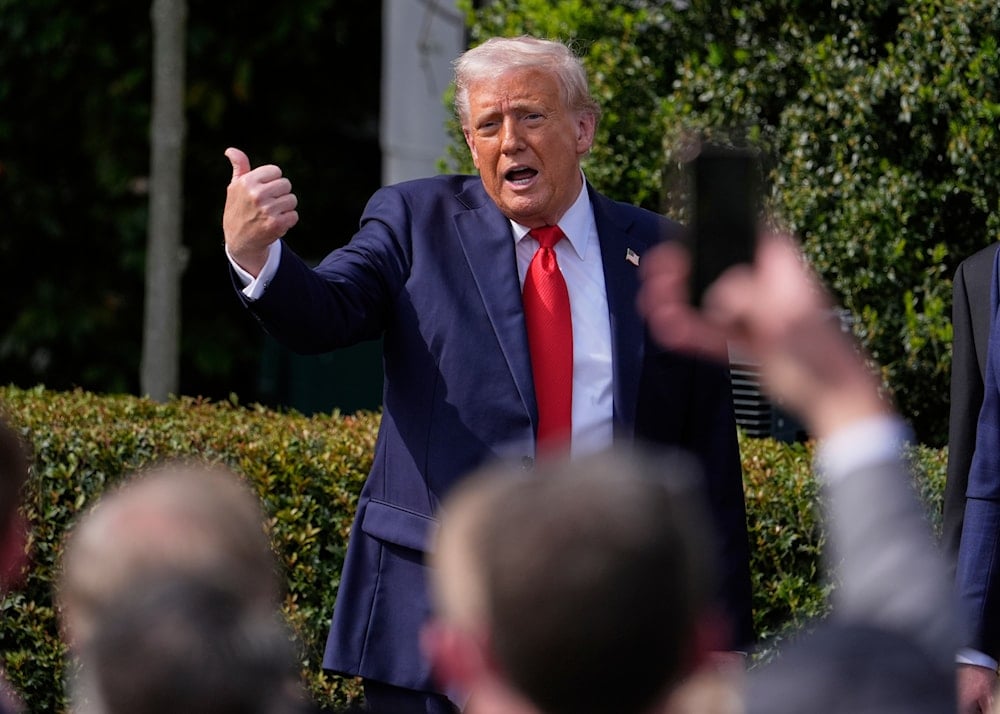Senior Trump advisors warned him of tariff consequences: CBS News
Trump's inner circle and advisors clashed with each other amid the US President's "Liberation Day" tariffs, which upended the global economy.
-

President Donald Trump waves to the crowd after honoring the 2025 national champion Ohio State football team on the White House South Lawn, April 14, 2025. (AP)
Senior advisors who are close to President Trump had warned that certain tariff proposals could potentially have devastating effects not only on global financial markets but also on the stability of the US economy, according to CBS on Tuesday.
Despite the White House’s insistence that administration officials are united behind the April 2 tariff effort, dubbed "Liberation Day," multiple sources familiar with internal discussions told CBS News that disagreements over the policy emerged long before its announcement, with senior leaders warning of potential severe economic instability.
Trump's inner circle stumbles into itself
In late March, just days before Mr. Trump announced his "reciprocal" tariffs, a heated argument erupted between Treasury Secretary Scott Bessent and White House trade adviser Peter Navarro, which took place in Chief of Staff Susie Wiles' office, according to CBS News.
Navarro pushed for imposing 25% across-the-board tariffs on all $3 trillion of imported goods, while Bessent, an experienced Wall Street investor, cautioned about the potential for severe market turmoil and laid out various economic scenarios, according to multiple sources familiar with the meeting.
The trade advisor sneered, "You're doing the same thing they did in the first term—don't pull this, don't be him," which advisors in the room later told people close to them was a reference to avoiding the approach of then-Treasury Secretary Steven Mnuchin and then-economic advisor Gary Cohn, both former Goldman Sachs executives who had resisted hardline tariff policies during the first Trump administration.
"Fake news from malevolent anonymous sources. Scottie and I don't argue. We think things through," Navarro told CBS News.
In other internal debates before the Rose Garden announcement, Commerce Secretary Howard Lutnick warned that certain tariffs risked triggering global disaster, while Bessent repeatedly advocated for a more measured approach, pushing for a carefully calculated rollout with targeted tariffs rather than the sweeping across-the-board measures Navarro championed.
Elon Musk, the administration's top government efficiency advisor, was not included in key decision-making meetings on the tariffs.
Though Musk kept his strong objections to certain aspects of the policy largely private, sharing them only in very small circles, some of his criticism eventually spilled into public view through social media attacks on Navarro and open advocacy for eliminating all tariffs between the United States and the European Union.
Tariffs throw the globe into turmoil
In the days following the "Liberation Day" announcement, financial markets plunged as trillions of dollars were wiped from major stock indexes while bond markets flashed warning signs, validating earlier warnings from some of Trump's advisers.
Wall Street firms like Goldman Sachs were raising recession probabilities, and leading US CEOs were voicing public alarm.
During an April 9 morning interview with Maria Bartiromo, JPMorgan Chase CEO Jamie Dimon, America's most prominent banker, warned that a recession appeared increasingly likely as an outcome.
During a CNBC appearance, Delta CEO Ed Bastian characterized the economic turmoil as "self-inflicted" while announcing the airline's decision to suspend its full-year guidance due to what he described as "uncharted, unprecedented uncertainty" in the market.
That same morning, as markets continued their slide, Trump took to social media in an attempt to calm nervous investors and corporate leaders, posting in his characteristic all-caps style: "BE COOL! Everything is going to work out well," a message that contrasted sharply with the growing warnings from financial experts.
As markets continued their downward spiral through the afternoon, Trump, after consulting with Bessent and Lutnic, moved to ease tensions by announcing a 90-day pause on certain tariffs, later explaining his decision by remarking, "Well, I thought that people were jumping a little bit out of line... they were getting yippy — you know, they were getting a little bit yippy, a little bit afraid," suggesting he viewed the market reaction as an overreaction that needed calming.

 4 Min Read
4 Min Read








